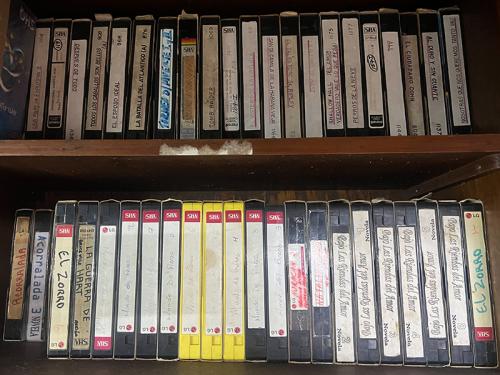SLA Professor Awarded $88,000 NSF Grant to Explore Gender Dynamics in Cuban Media Piracy
Original story from the School of Liberal Arts, published on January 24, 2024.
Laura-Zoë Humphreys, an Associate Professor in Communication at the School of Liberal Arts and a Core Faculty at the Stone Center for Latin American Studies, has been honored with the National Science Foundation’s (NSF) Cultural Anthropology Program Senior Research Award, securing more than $88,000 in funding. This grant will support Humphreys' ongoing research on Cuban media piracy—focusing on the impact of gender on the consumption and distribution of unauthorized global media within the island nation.
Humphreys has spent the last two decades studying Cuba, conducting research and living in Havana for months at a time. Her first book, Fidel Between the Lines: Paranoia and Ambivalence in Late Socialist Cuban Cinema (Duke University Press, 2019), shows how allegory and political paranoia shape the public sphere. Her current research is part of a second book project tentatively titled Waiting for the Copy: Gender and Media Piracy in Cuba. The project spans the history of media piracy in Cuba, from post-revolution stolen radio waves, through pirated satellite television and the VHS banks and salons of the nineties and early aughts, up into the digital contemporary landscape, where bundles, or “paquetes” of downloaded media travel the island on hard drives, circumvent the country’s limited internet infrastructure.
“There is a stereotype of Cuba being stuck in time or cut off from the rest of the world,” Humphreys says. “But what's interesting to me is that—while yes, they have had to struggle to gain access to it—Cuban people have always been immersed in global media flows."
Furthermore, Humphreys explains, in our current era—where streaming services dictate much of the world’s access to content—Cuban offline storage systems for pirated material have actually evolved into legitimate media archives.

Pirated VHS tapes like these were often seized by Cuban police but then sent to state-operated video rental stores for "legal" consumption
In her research, Humphreys discovered the ways that gender shaped these informal media economies in terms of infrastructure, labor, and reception. During the nineties and early aughts, she found women who operated VHS banks from their homes to create informal means of living. Later, as media became digitized and piracy businesses were state-sanctioned, women were pushed out of male-dominated distribution networks. They remained, however, the media’s biggest consumers, particularly of pirated South Korean dramas, Turkish soaps, and Mexican telenovelas, which provided a lens for Cuban women to "reimagine race, romance, and capitalism."
The NSF grant will directly support various aspects of the research, and enable Humphreys to fund two Cuban research collaborators, Daymar Valdés Frigola and Sheyla Pool. Valdés Frigola, a Cuban film researcher and an archivist at the Cinemateca de Cuba, will join Humphreys in her fieldwork exploring the historical roots of media piracy. The Cuban sound engineer and film director Sheyla Pool will subsequently collaborate in producing bilingual podcast episodes alongside the research. The aim is to release the podcast through the book’s website and independent Cuban journalism sites, providing a public-facing dimension for both Cuban and international audiences. Throughout the project, Humphreys and her co-researchers are dedicated to preserving these unofficial histories of Cuban media, often reflecting significant political and historical moments, for the nation’s younger generations, and the rest of the world.
Humphreys has previously received a Wenner-Gren Post-PhD Research Grant and a Louisiana Board of Regents ATLAS award for related research. She now joins three other SLA faculty members with current NSF grants: Patrick Button (Economics), Brandon Davis (Political Science), and Katharine Jack (Anthropology).
